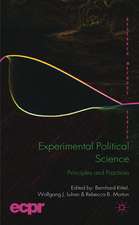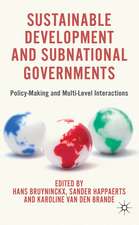The Palgrave Handbook of Global Political Psychology: Palgrave Studies in Political Psychology
Editat de C. Kinnvall Autor H. Dekker Editat de T. Capelos, P. Nesbitt-Larkingen Limba Engleză Hardback – 30 oct 2014
| Toate formatele și edițiile | Preț | Express |
|---|---|---|
| Paperback (1) | 1008.12 lei 6-8 săpt. | |
| Palgrave Macmillan UK – 25 mar 2017 | 1008.12 lei 6-8 săpt. | |
| Hardback (1) | 962.35 lei 6-8 săpt. | |
| Palgrave Macmillan UK – 30 oct 2014 | 962.35 lei 6-8 săpt. |
Preț: 962.35 lei
Preț vechi: 1173.60 lei
-18% Nou
Puncte Express: 1444
Preț estimativ în valută:
184.14€ • 192.26$ • 152.40£
184.14€ • 192.26$ • 152.40£
Carte tipărită la comandă
Livrare economică 04-18 aprilie
Preluare comenzi: 021 569.72.76
Specificații
ISBN-13: 9781137291172
ISBN-10: 1137291176
Pagini: 475
Ilustrații: XIX, 475 p.
Dimensiuni: 155 x 235 x 25 mm
Greutate: 0.93 kg
Ediția:2014
Editura: Palgrave Macmillan UK
Colecția Palgrave Macmillan
Seria Palgrave Studies in Political Psychology
Locul publicării:London, United Kingdom
ISBN-10: 1137291176
Pagini: 475
Ilustrații: XIX, 475 p.
Dimensiuni: 155 x 235 x 25 mm
Greutate: 0.93 kg
Ediția:2014
Editura: Palgrave Macmillan UK
Colecția Palgrave Macmillan
Seria Palgrave Studies in Political Psychology
Locul publicării:London, United Kingdom
Cuprins
PART I: INTRODUCTION 1. Introduction: Origins, Developments and Current Trends; Tereza Capelos, Henk Dekker, Catarina Kinnvall and Paul Nesbitt-Larking PART II: METHODOLOGICAL APPROACHES 2. Social Representations and the Politics of Participation; Caroline Howarth, Eleni Andreouli and Shose Kessi 3. Social Identity Theory and Self-Categorisation Theory; Denis Sindic and Susan Condor 4. Psychoanalysis as Political Political Psychology; Stephen Frosh 5. Methodological Approaches in Political Psychology: Discourse and Narrative; Phillip L. Hammack and Andrew Pilecki 6. Dialogical Approaches to Psychology and Ethics; Sarah Scuzzarello 7. Experiments: Insights and Power in the Study of Causality; Tereza Capelos PART III: THEMES 8. Lessons from the Postcolony: Frantx Fanon, Psychoanalysis and a Psychology of Political Critique; Ross Truscott and Derek Hook 9. Conflict Analysis and International Relations; Karin Aggestam 10. 'Do the Terrorists have Goatee Beards?': Contemporary Understandings of Terrorisms and the Terrorist; James McAuley 11. Gender, Race and Ethnic Relations; Sebastian E. Bartos and Peter Hegarty 12. Voting and Not Voting: The Principal Explanations; Henk Dekker PART IV: HOT ISSUES 13. Political Emotions; Nicolas Demertzis 14. Group-Focused Enmity: Prevalence, Correlations and Causes of Prejudices in Europe; Beate Küpper and Andreas Zick 15. Political Psychology of European Integration; Ian Manners 16. Migration and Multiculturalism; Paul Nesbitt-Larking 17. Political and Civic Participation among Ethnic Majority and Minority Youth; Dimitra Pachi, Theopisti Chrysanthaki and Martyn Barrett 18. Fear, Insecurity and the (Re) Emergence of the Far Right in Europe; Catarina Kinnvall 19. A Political Psychology of Conflict: The Case of Northern Ireland; Neil Ferguson, Orla Muldoon and Shelley McKeown 20. Narrating Moments of Political Change; Molly Andrews 21. The Culture of Conflict and its Routinisation; Daniel Bar-Tal, Guy Abutul Selinger and AmiramRaviv 22. Narrative Constructions of Conflict and Coexistence: The Case of Bosnia-Hezegovina; Johanna Mannergren Selimovic 23. Political Socialisation and Social Movements: Escaping the Political Past? Igor Petrovi?, JAcquelien van Stekelenberg and Bert Klandermans PART V: CONCLUSION 24. Ideology, Society and the State: Global Political Psychology in Retrospect; Paul Nesbitt-Larking
Notă biografică
Karin Aggestam, Lund University, Sweden Eleni Andreouli, Open University, UK Molly Andrews, University of East London, UK Martyn Barrett, University of Surrey, UK Daniel Bar-Tal, Tel Aviv University, Israel Sebastian E. Barto?, University of Surrey, UK Theopisti Chrysanthaki, London School of Hygiene and Tropical Medicine, University of London, UK Susan Condor, Loughborough University, UK Nicolas Demertzis, Athens University, Greece and Greek National Centre for Social Research (EKKE) Neil Ferguson, Liverpool Hope University, UK Stephen Frosh, Birkbeck College, University of London, UK Phillip L. Hammack, University of California, Santa Cruz, USA Peter Hegarty, University of Surrey, UK Derek Hook, Birkbeck College, University of London, UK, London School of Economics, UK and University of Pretoria, South Africa Caroline Howarth, London School of Economics and Political Science, UK Shose Kessi, University of Cape Town, South Africa Bert Klandermans, VU-University, Amsterdam, the Netherlands Beate Küpper, University of Applied Science Niederrhein, Germany Ian Manners, University of Copenhagen, Denmark James W. McAuley, University of Huddersfield, UK Shelley McKeown, Leiden University College, the Hague, the Netherlands Orla Muldoon, University of Limerick, Ireland Dimitra Pachi, University of BPP, UK Igor Petrovi?, VU-University, Amsterdam, the Netherlands Andrew Pilecki, University of California, Santa Cruz, USA Amiram Raviv, Or Yehuda, Israel, Sarah Scuzzarello, City University London, UK Johanna Mannergren Selimovic, Swedish Institute of International Affairs Denis Sindic, University of Lisbon, Portugal Jacquelien van Stekelenburg, VU-University Amsterdam, the Netherlands Ross Truscott, University of Fort Hare in East London, South Africa Andreas Zick, Bielefeld University, Germany
Caracteristici
Redraws the boundaries of the field of political psychology and maps the field in its entire The editors and contributors include two Vice-Presidents of the International Society of Political Psycholog
























